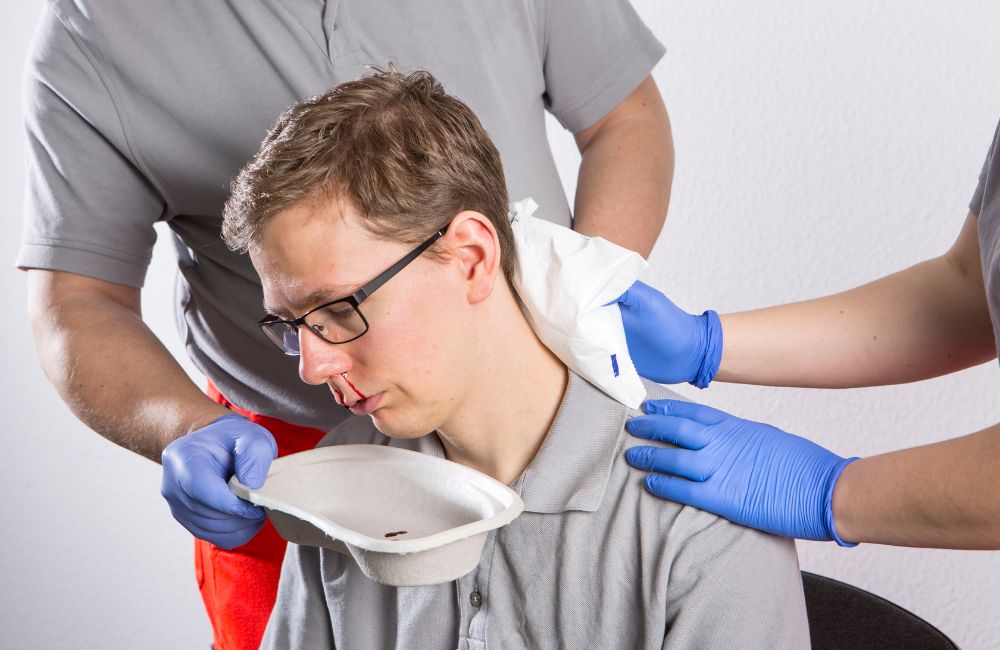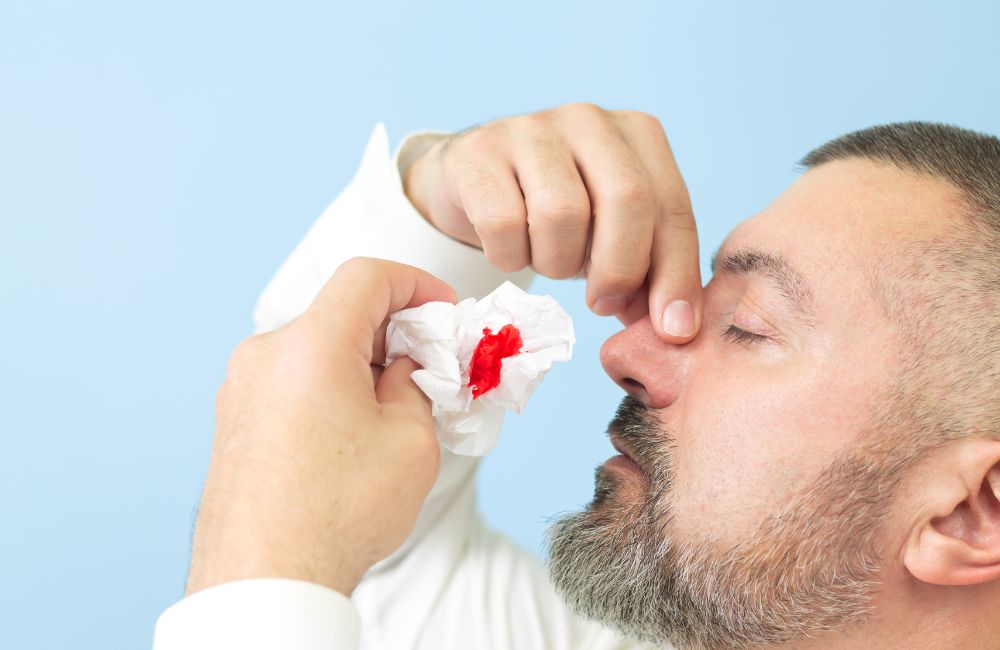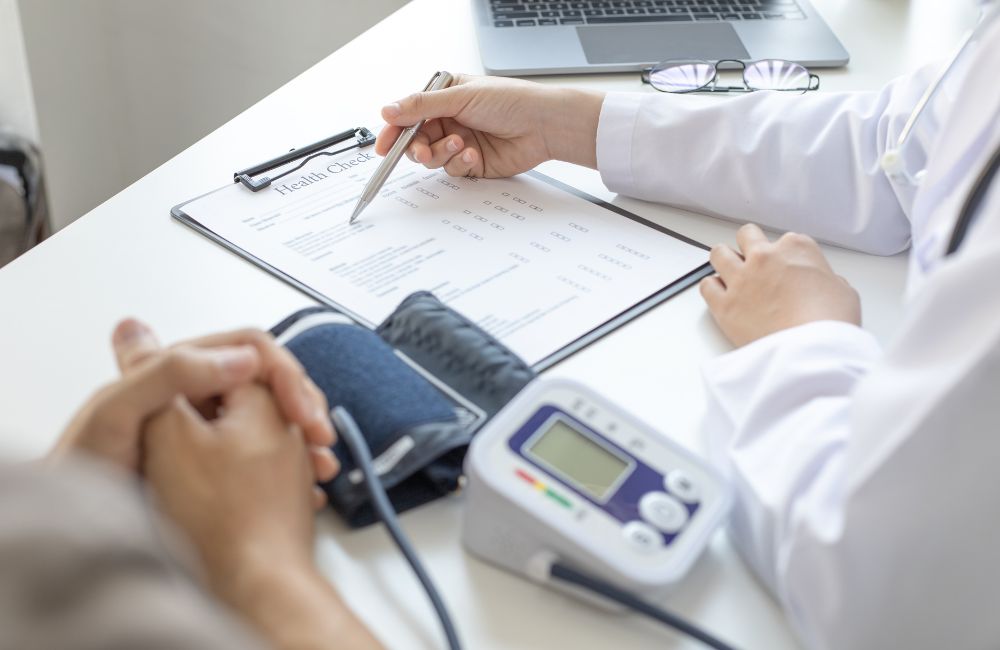
Nosebleeds, medically known as epistaxis, are a common occurrence that can happen to anyone at any age. While they are usually not a cause for alarm, severe or recurrent nosebleeds can be concerning and may require medical attention. Understanding the causes, proper treatment, and knowing when to seek urgent care in North Haven, CT, for nosebleeds is essential for maintaining your health and peace of mind.
Key Takeaways
What is Epistaxis?
What Causes Nosebleeds?
Who is Prone to Nosebleeds?
Types of Nosebleeds
How to Stop a Nosebleed at Home
When Should I Seek Urgent Care in North Haven, CT?
What Are the Treatments for Epistaxis?
Frequently Asked Questions
Trust DOCS Urgent Care & Primary Care – North Haven for Nosebleed Concerns!

When we talk about nosebleeds, or “Epistaxis,” as doctors call it, we’re referring to bleeding from the inside of your nose. This can happen in one or both nostrils, but most of the time, only one side is affected.
Inside your nose, there’s a network of tiny blood vessels. These vessels have an important job: warm and moisten the air you breathe. However, because these vessels are right at the surface, they’re delicate. Air moving in and out of your nose can dry out and irritate these vessels. This irritation makes them easy to damage, which can lead to a nosebleed.
Although nosebleeds might seem alarming, they’re usually not a sign of anything serious. In fact, nosebleeds are common. About 60% of people will experience a nosebleed at some point. But it’s comforting to know that only about 10% of these cases are serious enough to require a doctor’s care.
Nosebleeds, medically known as epistaxis, arise from various factors, most of which are not cause for serious concern. Understanding these causes is the first step toward effective prevention and management.
The leading cause of nosebleeds is exposure to dry air. This condition is prevalent in hot, low-humidity climates and during winter when indoor heating systems are used. Dry air leads to dehydration of the nasal membrane — the delicate tissue lining the inside of your nose. As the membrane dries, it becomes crusty or cracked, making it more susceptible to bleeding during rubbing, picking, or even when blowing your nose. Additionally, inserting objects into the nose or suffering injuries to the nose or face can provoke epistaxis under these dry conditions.
Upper respiratory infections, such as colds and sinusitis, can also trigger nosebleeds, especially when accompanied by repeated sneezing, coughing, and nose blowing. Allergic reactions and nonallergic rhinitis, which inflame the nasal lining, are further common culprits.
Blood-thinning medications, including aspirin, nonsteroidal anti-inflammatory drugs (NSAIDs), and warfarin, increase the risk of bleeding by impairing the blood’s ability to clot. Recreational drugs that are inhaled through the nose, like cocaine, directly damage the nasal membranes, leading to bleeding. Moreover, chemical irritants in cleaning supplies, workplace fumes, and other strong odors can irritate the nasal lining and provoke epistaxis.
High altitudes contribute to nosebleeds due to the thinner, drier air lacking moisture and oxygen. A deviated septum, an abnormality in the wall that divides the nostrils, can also lead to frequent nosebleeds by disrupting normal airflow and drying out the nasal passages.
Frequent use of nasal sprays and medications intended to alleviate symptoms like itchiness, congestion, or runniness can dry out the nasal membranes. Antihistamines and decongestants, in particular, may lead to a higher incidence of nosebleeds.
Though rarer, other factors can lead to nosebleeds:
Nosebleeds, or epistaxis, are common and affect people of all ages and demographics. Yet, certain individuals more frequently grapple with this inconvenient and often worrisome issue. Understanding who is at a higher risk can help manage and prevent nosebleeds more effectively.
Children, particularly those between two and ten, are notably prone to nosebleeds. The combination of dry air, common colds, allergies, and the innocent yet risky behavior of inserting fingers or foreign objects into their noses sets the stage for frequent episodes. The delicate nasal passages of children are easily irritated and more susceptible to bleeding, making nosebleeds a common childhood experience.
Adults between the ages of 45 and 80 also face a heightened risk of experiencing nosebleeds. As people age, blood may take longer to clot, and conditions such as high blood pressure and atherosclerosis (the hardening of artery walls) become more common. These factors, alongside the potential presence of bleeding disorders, significantly contribute to the increased incidence of nosebleeds in this demographic.
Pregnancy brings about many changes in the body, including an expansion of blood vessels. This expansion puts additional pressure on the nose’s delicate vessels, making pregnant people more susceptible to nosebleeds. The increased blood volume during pregnancy further exacerbates this vulnerability.
People taking medications that thin the blood, such as aspirin and warfarin, are at a higher risk. These drugs reduce the blood’s ability to clot, increasing the likelihood of prolonged bleeding from even minor nasal irritations.
Individuals with conditions that affect blood clotting, including hemophilia and von Willebrand disease, naturally face a greater risk of nosebleeds. The inability of the blood to clot efficiently can turn even a minor nasal injury into a significant bleeding event.
Though nosebleeds are often lumped into one general category, there are actually two distinct types, each originating from different nose parts.
Anterior nosebleeds are the most common type, accounting for most cases. These bleeds originate from the front part of the nasal septum, where a dense network of blood vessels resides. These vessels, located beneath the surface, are particularly susceptible to injury from external factors like dry air, picking, or minor trauma. Anterior nosebleeds are generally less severe and can often be managed at home with simple first-aid measures, such as pinching the nose and leaning forward. However, if an anterior nosebleed persists despite home treatment, seeking urgent care in North Haven, CT, may be necessary for professional medical assistance.
Though less common, posterior nosebleeds are typically more serious and require medical attention. These bleeds originate from arteries in the back part of the nose, making them more challenging to control. They are more likely to occur in older adults and can be caused by underlying health issues such as hypertension, atherosclerosis, or injuries that affect the back of the nose. Due to their severity and the difficulty in managing them at home, posterior nosebleeds frequently necessitate a visit to urgent care in North Haven, CT, where specialized treatments like nasal packing or cauterization can be administered by healthcare professionals.
Experiencing a nosebleed can be unsettling, but most can be managed effectively with simple first-aid measures. After the nosebleed has stopped, avoid activities that could strain or increase pressure in your nose for several days, such as bending over, lifting heavy objects, or blowing your nose. If your nosebleed doesn’t stop after these steps or if you’re experiencing frequent nosebleeds, it might be time to seek urgent care in North Haven, CT.
But before that, try the following steps to control a nosebleed from the comfort of your home, first:
Deciding when to seek urgent care in North Haven, CT, for a nosebleed can sometimes be challenging, especially when unsure about the severity of the situation. However, there are specific instances where the decision should be straightforward. Understanding these scenarios can ensure you or your loved ones receive the right care at the right time.
If you or someone you care for frequently experiences nosebleeds, it’s a signal to seek the expertise at urgent care in North Haven, CT. Regular occurrences might point to an underlying condition that requires medical attention.
Feelings of weakness, faintness, tiredness, coldness, shortness of breath, or observing pale skin alongside nosebleeds suggest it’s time to visit urgent care in North Haven, CT. These symptoms, in combination with epistaxis, could indicate anemia.
The co-occurrence of epistaxis with unusual bruising across the body is a red flag. This combination may suggest a more severe condition, such as a blood clotting disorder, leukemia, or a nasal tumor, necessitating a prompt visit to urgent care in North Haven, CT.
If a nosebleed follows an accident or an impact to the head, face, or nose, immediate medical evaluation at an urgent care in North Haven, CT, is critical. Such situations could involve more serious injuries that aren’t immediately apparent.
Blood clots, coughing or vomiting blood, difficulty breathing, or a rapid heartbeat alongside a nosebleed are significant reasons to visit urgent care in North Haven, CT. These symptoms can indicate a more urgent health issue.
Developing a nosebleed after starting a new medication should prompt a visit to urgent care in North Haven, CT. This could be an adverse reaction to the medication, requiring medical review and possibly adjusting your prescription.

Epistaxis, or nosebleeds, can be startling and uncomfortable, but various effective treatments are available. The choice of treatment typically depends on the underlying cause of the nosebleed. Urgent care in North Haven, CT, offers a range of options for managing epistaxis swiftly and safely.
One common approach is nasal packing, where healthcare providers insert gauze, special nasal sponges, foam, or an inflatable latex balloon into the nostril to exert pressure on the bleeding site. This method can effectively control the bleed; the material may be left in place for 24 to 48 hours. For individuals experiencing severe or persistent nosebleeds, visiting an urgent care in North Haven, CT, can provide quick access to this treatment.
Cauterization involves sealing the bleeding blood vessel with a chemical substance like silver nitrate or heat energy (electrocautery). Before this treatment, a local anesthetic is sprayed into the nostril to numb the area, ensuring the process is as comfortable as possible. This method is often available at urgent care centers in North Haven, CT, where skilled providers can perform the procedure efficiently.
To manage epistaxis, it might be recommended to adjust the dosage or stop blood-thinning medications. Additionally, if high blood pressure is a contributing factor, medications may be necessary. Urgent care in North Haven, CT, can assess your current medications and possibly prescribe alternatives like Tranexamic acid, which aids in blood clotting.
In cases where a foreign object lodged in the nose is causing the bleed, professional removal is required. This procedure can be performed at urgent care in North Haven, CT, where providers can safely extract the object and treat the resulting nosebleed.
For more complicated cases, such as those caused by a broken nose or a deviated septum, surgical repair (septoplasty) or correction may be necessary. Also, ligation may be considered, where the bleeding vessel is tied off to stop the bleeding. While urgent care in North Haven, CT, can offer initial treatment and stabilization, they may also refer patients to specialists for these more invasive procedures.
While foods and drinks typically don’t cause nosebleeds, dehydration from insufficient fluids can lead to dry nasal membranes, increasing the risk of a nosebleed. Staying hydrated is key to keeping nasal passages moist.
Flying after a recent nosebleed should be approached with caution. The changes in air pressure could trigger another bleed. Consider consulting a healthcare provider from reputable urgent care in North Haven, CT, before flying if you’ve had a severe or recent nosebleed.
Stress doesn’t directly cause nosebleeds, but it can lead to behaviors (like nose-picking or rubbing) that do. Managing stress and avoiding these behaviors can help prevent nosebleeds.
Nosebleeds may appear more common at night due to prolonged exposure to dry air from heating systems while sleeping. Using a humidifier in your bedroom can help reduce this risk.
Intense exercise can sometimes lead to nosebleeds due to increased blood pressure, which can strain the delicate blood vessels in the nose. Staying hydrated and warming up properly before exercise can help mitigate this risk.

Understanding the causes, treatments, and preventive measures for nosebleeds is crucial for effective management. While many episodes can be handled at home, knowing when to seek professional care is important. For those needing urgent care in North Haven, CT, DOCS Urgent Care & Primary Care – North Haven offers comprehensive support for epistaxis and related concerns. With a dedicated team of healthcare professionals, DOCS Urgent Care & Primary Care – North Haven ensures that you receive timely and compassionate care whenever you face the discomfort of a nosebleed.



During this surge in COVID-19 cases, our primary focus is meeting the high demand for tests, and we are seeing higher than usual wait times. This means we are unable to answer most phone calls. Please know that our teams are working very hard during this time to care for as many patients as safely as possible. Please click the button below for answers to common questions. We appreciate your understanding.